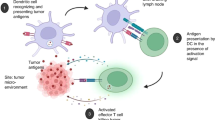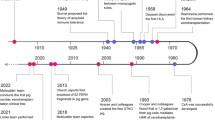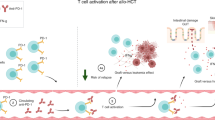Abstract
We examined the effect of class II transactivator (CIITA) down-modulation on allograft rejection. To inhibit the function of CIITA, we constructed a series of CIITA mutants and found one exhibiting the dominant-negative effect on the regulation of major histocompatibility complex (MHC) class II expression. To test whether the CIITA dominant-negative mutant reduces immunogenecity, CIITA-transfected melanoma cells were injected into allogeneic host and assessed for immune evading activity against host immune cells. We demonstrated that the CIITA dominant-negative mutant allowed tumor nodules to develop earlier in the lung than control by this tumor challenge study. Furthermore, skin grafts deficient for CIITA also survived longer than wild-type in allogeneic hosts. Both the tumor challenge and skin graft studies suggest the inhibition of CIITA molecules in donor tissue would be beneficial to the control of allo-response.
Similar content being viewed by others
Article PDF
Author information
Authors and Affiliations
Rights and permissions
This is an Open Access article distributed under the terms of the Creative Commons Attribution Non-Commercial License (http://creativecommons.org/licenses/by-nc/3.0/) which permits unrestricted non-commercial use, distribution, and reproduction in any medium, provided the original work is properly cited.
About this article
Cite this article
Kim, T., Choi, Y., Seo, J. et al. Delayed allograft rejection by the suppression of class II transactivator. Exp Mol Med 38, 210–216 (2006). https://doi.org/10.1038/emm.2006.26
Published:
Issue date:
DOI: https://doi.org/10.1038/emm.2006.26



